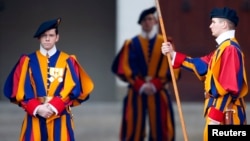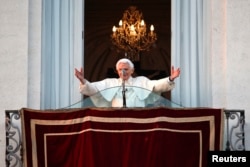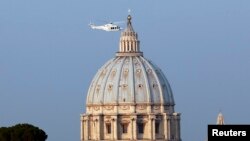Pope Benedict has resigned after nearly eight years in office, becoming the first Roman Catholic Church leader to step down voluntarily in 600 years.
Benedict's resignation took effect Thursday at 8 p.m. local time (1900 UTC), several hours after he left the Vatican by helicopter for the papal retreat of Castel Gandolfo, outside Rome. At the stroke of the hour, two Swiss Guards guarding the entrance of the residence symbolically closed the gates and left their posts.
Earlier, the 85-year-old pontiff pledged "unconditional reverence and obedience" to his eventual successor, as he addressed Roman Cardinals in a private farewell at the Vatican. He urged them to unite, saying "among you there is the future pope" whom they will have to choose in the coming weeks.
Vatican clergy and workers applauded as Benedict departed. Officials also sealed the papal apartment overlooking St. Peter's Square.
Benedict later made a brief appearance on the balcony of Castel Gandolfo, blessing thousands of well-wishers and describing himself as a pilgrim who is about to start his "last pilgrimage" on Earth.
In a final message on his official Twitter account, the leader of the world's one billion Catholics thanked his followers for their "love and support." He also wrote, "May you always experience the joy that comes from putting Christ at the center of your lives."
In the coming days, Roman Catholic cardinals will gather in the Vatican's Sistine Chapel for a conclave, a group meeting bound by centuries-old tradition that will elect a new pope.
Cardinals who are 80 or older will not vote.
Benedict gave his final address to the faithful at St. Peter's Square on Wednesday. He said the church experienced troubles and "stormy waters" during his tenure, but added that God will not let the institution sink.
The pontiff also said he is aware of the novelty and the gravity of his decision to step down, announced on February 11. The only other pope to do so of his own free will was Celestine V, a hermit who resigned in 1294 after several months in office, as a protest against Vatican infighting.
The church will refer to Benedict as "pope emeritus" in retirement. He is expected to return to a convent in the Vatican after several months at Castel Gandolfo. Benedict has said he plans to live quietly in prayer and meditation - in his words - "hidden to the world."
Some critics foresee possible tension between Benedict and the new pope who succeeds him. But, a Vatican spokesman, the Reverend Federico Lombardi, said Thursday that Benedict has "no intention of interfering in the positions, decisions or activities of his successor."
Benedict's resignation took effect Thursday at 8 p.m. local time (1900 UTC), several hours after he left the Vatican by helicopter for the papal retreat of Castel Gandolfo, outside Rome. At the stroke of the hour, two Swiss Guards guarding the entrance of the residence symbolically closed the gates and left their posts.
Earlier, the 85-year-old pontiff pledged "unconditional reverence and obedience" to his eventual successor, as he addressed Roman Cardinals in a private farewell at the Vatican. He urged them to unite, saying "among you there is the future pope" whom they will have to choose in the coming weeks.
Vatican clergy and workers applauded as Benedict departed. Officials also sealed the papal apartment overlooking St. Peter's Square.
Benedict later made a brief appearance on the balcony of Castel Gandolfo, blessing thousands of well-wishers and describing himself as a pilgrim who is about to start his "last pilgrimage" on Earth.
In a final message on his official Twitter account, the leader of the world's one billion Catholics thanked his followers for their "love and support." He also wrote, "May you always experience the joy that comes from putting Christ at the center of your lives."
In the coming days, Roman Catholic cardinals will gather in the Vatican's Sistine Chapel for a conclave, a group meeting bound by centuries-old tradition that will elect a new pope.
Cardinals who are 80 or older will not vote.
Benedict gave his final address to the faithful at St. Peter's Square on Wednesday. He said the church experienced troubles and "stormy waters" during his tenure, but added that God will not let the institution sink.
The pontiff also said he is aware of the novelty and the gravity of his decision to step down, announced on February 11. The only other pope to do so of his own free will was Celestine V, a hermit who resigned in 1294 after several months in office, as a protest against Vatican infighting.
The church will refer to Benedict as "pope emeritus" in retirement. He is expected to return to a convent in the Vatican after several months at Castel Gandolfo. Benedict has said he plans to live quietly in prayer and meditation - in his words - "hidden to the world."
Some critics foresee possible tension between Benedict and the new pope who succeeds him. But, a Vatican spokesman, the Reverend Federico Lombardi, said Thursday that Benedict has "no intention of interfering in the positions, decisions or activities of his successor."






